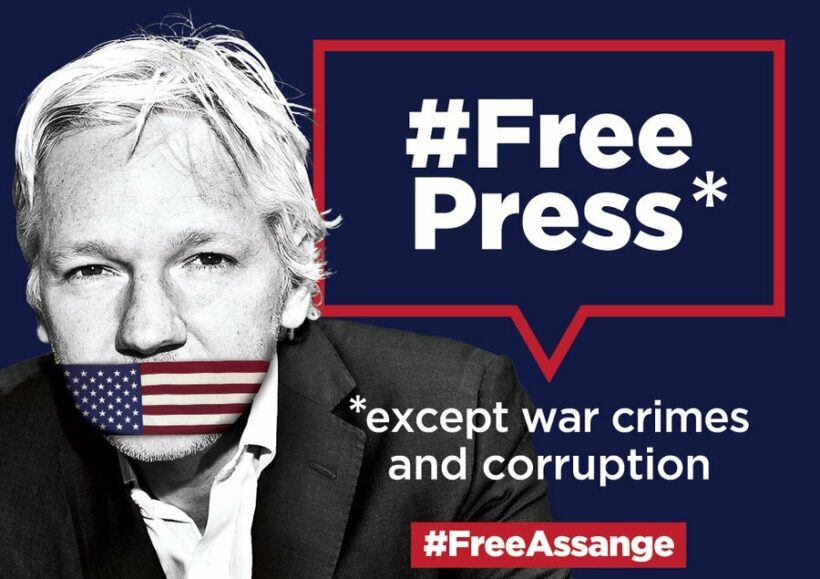Media organisations across the globe are marking World Press Freedom Day with a re-energised push for the release of award-winning Australian publisher Julian Assange.
US President Joe Biden is facing growing pressure to drop charges against Assange as Australia’s Media Entertainment Arts Alliance (MEAA), the International Federation of Journalists, the European Federation of Journalists and major global media outlets describe the ongoing persecution of the WikiLeaks founder as “the most dangerous threat to press freedom today”.
Assange’s brother, Gabriel Shipton, a filmmaker, says: “Each day Julian spends in prison is another day we must all question whether journalists around the world are truly free to report US foreign and military policy”.
“Four years of confinement in a maximum-security prison and 13 years isolated from the world – what will it take for the appetite of those who wish to punish Julian to be satiated?“
In 2010, Assange published US government records on WikiLeaks that revealed the US military committed war crimes against civilians in Afghanistan and Iraq, including the killing of two Reuters journalists. Since April 2019, he has been held in a jail cell in the UK’s high-security Belmarsh Prison, fighting extradition to the US. If found guilty, he faces a jail term of up to 175 years.
“Back in 2010, Julian worked with leading media outlets from around the world to publish factual information in the public interest about US war crimes in Afghanistan and Iraq. Many of the revelations were deeply embarrassing to the US and its allies, including Australia,” says Assange’s brother.
“In November last year, the first media outlets to publish WikiLeaks material – The Guardian, the New York Times, Le Monde, Der Spiegel, and El País – came together to publicly oppose Assange’s persecution and urge the US government to drop all charges against him. They published an open letter, under the title ‘Publishing is not a crime’, which called the prosecution a direct attack on media freedom. “
Gabriel Shipton concludes: “And while Julian has been singled out and continues to suffer the vicious wrath of the US Government, it’s heartening to see these media outlets calling for Julian’s freedom, and we hope they continue to do so.”
In 2011, Assange and WikiLeaks were awarded the Walkley Award for Most Outstanding Contribution to Journalism. At the time the Walkley judges said WikiLeaks applied new technology to “penetrate the inner workings of government to reveal an avalanche of inconvenient truths in a global publishing coup”.
Assange Campaign Legal Advisor, Greg Barns SC says: “The Assange case represents an ideal opportunity for the Albanese government to demonstrate in a powerful way, that its commitment to press freedom is not simply rhetoric and roundtables.”
The MEAA 2022 press freedom survey showed that a staggering 92.5% of media workers said they feared that threats, harassment and intimidation of journalists are on the rise.
MEAA Media President, Karen Percy says she is saddened that the case continues to drag on for Assange who has been a member of the union since 2007.
“The prosecution of Julian Assange imperils journalism everywhere and undermines the United States’ reputation as a safe place for press freedom and free speech. We urge the Australian government to ramp up its advocacy to the Biden Administration for the charges be dropped, which would allow Assange to be released from prison and reunited with his family,” says Ms Percy.
World Press Freedom Day – 3 May
“The true test of a free press is not how it treats those in power, but how it treats those who are powerless.” – Julian Assange
Background information courtesy assangecampaign.org.au:
4 January 2021: Westminster Magistrates Court discharges [throws out] the US extradition request against Julian Assange. District judge Vanessa Baraitser rules that extradition is barred under the 2003 Extradition Act because it is “oppressive” (s.91). The United States Government appeals.
27-28 October 2021: US appeal hearing before the High Court Appeal. Julian Assange suffers a transient ischemic attack (TIA) on the first day.
10 December 2021: The decision to discharge the extradition request is overturned by the High Court due to the United States Government issuing so-called ‘diplomatic assurances’ to the UK Government. The High Court rejects the United States Government’s arguments that the district judge erred in her findings.
14 March 2022: The Supreme Court refuses Julian Assange permission to appeal the High Court’s decision. The case is sent back to the Magistrates’ Court with instruction to issue the extradition order.
20 April 2022: The Magistrate issues the extradition order, which is sent to Home Secretary Priti Patel for approval.
17 June 2022: Home Secretary Priti Patel approves the extradition order to extradite Julian Assange to the United States.










